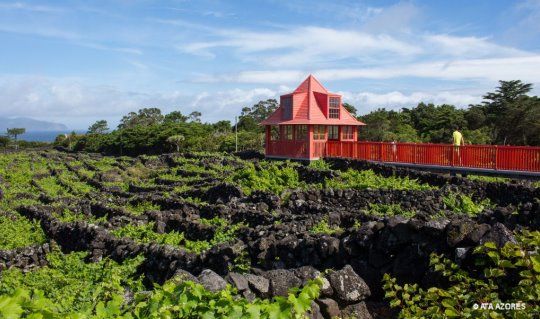
The Mountain Island
World Heritage Site by UNESCO
Pico is the second largest island in the Azores, named after its mountain, considered Portugal’s highest mountain, at 2,351m above sea level - it’s been classified as Nature Reserve since 1982. The mighty mountain is always visible, whether it sits behind the morning fog or stands out with its perfect cone shape emerging from the dark blue Ocean waters Ocean, against the fiery sky during sunset.
The island beauty is enhanced by its unique landscape of a sublime mixture of lava rock, black volcanic soil and exotic vegetation. It’s possible to unveil the flora and fauna of Pico, by hiking one of the island various trails, including the ultimate hiking experience of Portugal’s highest mountain. Another incredible location is one of the world’s longest lava tubes located in “Gruta das Torres”. It stretches for 5 KMS and embellished with rare stalactites and stalagmites that have been unaffected by outside or artificial light.
The extensive lava fields that dot the island is commonly referred by locals as “Lajidos” or “cookie lands”. Regardless of the chosen name, these fields form the Landscape of the Pico Island Vineyard culture, declared as World Heritage Site by UNESCO in 2004. Within the premises is an interpretation center in Lajido de Santa Luzia. Upon arrival to the center, guests are invited to watch a short documentary about the vineyard culture, followed by a guided visited to vineyards. Which are planted into the rocks or volcanic soils, deliberately delivers a distinctive characteristic to the Azorean wine that you’ll be able to taste in the end of the visit. To further enjoy the local wine, we recommend a stop at Cella Bar, a perfect retreat where the local wine is paired with the island traditional gastronomy. Not to mention, the building itself is an architectural oasis, awarded the “building of the year” in 2016.
Pico Island has a strong whaling tradition that started in the end of 19th century, and played an important role in the local economy until 1989 when whaling was forbidden. Yet, it has the only museum in Portugal specialized in artisanal, seasonal and coastal whaling called Whaling Museum. Consists of three houses from 19th century, where the whalers used to keep their boats and an old blacksmith’s forge. These buildings still preserve many of their original features. Recently a new building was built strongly marked by architecture of North American whaling inspiration, housing an archive and library specialized in whaling. An interesting add-on to the museum visit is doing a morning whale watching expedition.
The experience would not be complete without a perfect location to stay. The Aldeia da Fonte hotel, offers six amazing volcanic stone houses, leaning over the cliffs to the Atlantic Ocean, featuring a total of 40 rooms surrounded by lush gardens, the perfect setting for a sunrise or sunset private yoga class.
